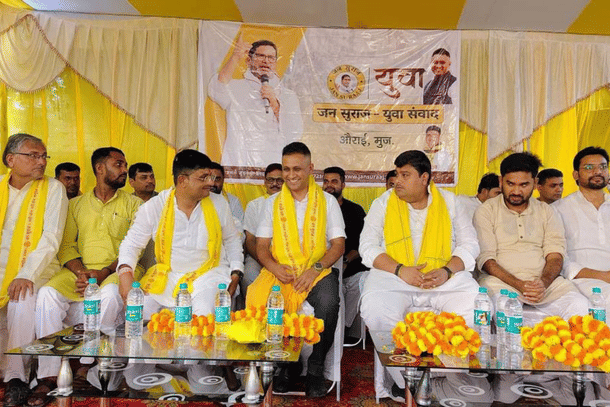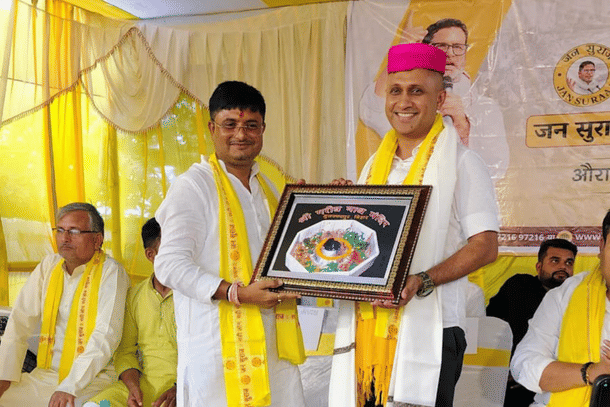Politics
Bihar: Why This Former 'Super' Cop Turned Away From BJP And Joined Prashant Kishor's Jan Suraaj
Abhishek Kumar
Sep 19, 2024, 07:16 PM | Updated Jan 10, 2025, 04:36 PM IST
Save & read from anywhere!
Bookmark stories for easy access on any device or the Swarajya app.


Jan Suraaj is unquestionably the rising political force in Bihar. It's got other political parties in the state almost playing catch-up, whether they are in power or out of it.
Of course, Prashant Kishor is ‘The Jan Suraaj Guy.’ But there's another individual who is not too far behind in fame within the party.
Anand Mishra has rightfully earned the title 'Assam's Singham' due to his leadership in anti-insurgency operations and his no-nonsense attitude, which have elevated him to stardom.
Despite his exceptional success as a police officer, Mishra left that job behind to try public service in a different avatar. He did it to contest the Lok Sabha election from Buxar, and the Bharatiya Janata Party (BJP) was his first choice to represent in the polls.
But, to his surprise, he found the BJP's functioning disconnected from what they say. So, then he contested as an independent and is even believed to have been the catalyst behind the BJP losing the Buxar seat.
Later, he joined the party on the ascendancy in Bihar, Jan Suraaj, and now spends his time strengthening it on a grassroots level.
Swarajya asked Mishra some questions about his interesting career transition from police to politics, his experience with the BJP, his vision for Jan Suraaj, and more. Here are the edited excerpts:
What brought you to Jan Suraaj?
When I decided to join politics, the BJP was a natural choice. I have been a Swayamsevak since childhood, and the BJP is a party born out of the Rashtriya Swayamsevak Sangh (RSS).
I was in talks with them, but when I finally arrived, they did not give me a place. Then I understood that there is a dichotomy here — they say one thing but do the opposite.
They talk about promoting merit, working for the national interest, and doing good for people, but when it comes to action, certain fears run through the system. They fear that the right person will disturb their system and discourage the flow of money (“na khaunga na khane dunga”).
People in the BJP are more like, “Main sab khaunga aur koi iske beech nahi aayega” (I will take everything and no one will get in my way).
There is a coterie in the BJP that won’t allow you to enter if you are a person of principles, advocate for public interest, or if perform your work honestly.
After it became clear to me, I had the option of remaining independent or forming my own party. I was then introduced to Jan Suraaj and found that its ideology aligns exactly with my vision.
An example?
I believe in country first, Bihar first. Behind everything I do, my motive is to ensure betterment for this land — how it will be better for Bihar and its people and how Bihar will contribute to nation-building.
From this perspective, I find that Jan Suraaj is also working toward it. Now, if I form my own party, toil hard for many years, and succeed in creating a political unit, why would I waste my time on that?
Secondly, if I form my own party, Jan Suraaj and my ideology will be the same. Jan Suraaj will officially be bigger than my party, then I will end up disturbing Jan Suraaj’s vote base, which is a sin in itself.
I find it wrong that if a person (Prashant Kishor) is taking on such a humongous task, I would disturb him out of personal ego. I am not here for my personal ego; I am here for Bihar, my country.
If it was about me, the IPS job was not bad for me; I was a Superintendent of Police in a district. That is why I enrolled in Jan Suraaj, as their ideology aligns exactly with what I wanted.
I wanted the BJP to embody this ideology, but when I saw it on the ground, it was totally different. The value system I imbibed during my visits to the Shakhas is not found in the party’s offices.
I felt bad that these people were not following the core ideology and principles of the party. Most of them are not original BJP members but have switched sides to join the BJP.
They tried to settle in other places but did not find a suitable home, so they joined the BJP and now eat it from within. The original members are scattered here and there.
Do you think the BJP’s problem is bottom-up?
Yes, definitely it is bottom-up. Now, I believe that it is not easy to course-correct. They had an opportunity with a good headstart in 2014. It was a good beginning — the goal was good, the methodologies were good — but gradually the upper echelons of the party became insulated from what was happening on the ground.
There is a problem in the feedback loop there. So, Jan Suraaj is the only option. You tell me, where else can I go? For any wise person devoted to development, Jan Suraaj seems to be the only option.
You've seen the BJP's functioning, contested as an independent, and joined Jan Suraaj. What differences do you notice between Jan Suraaj and other parties?
Jan Suraaj is well organised. Its organisational capability is far better. Currently, things are being set up in an official way, so it seems bureaucratic.
Once it takes a political shape on 2 October, seasoned politicians will take charge, creating a beautiful balance between organisational approach and political methodologies.
By political, I mean how politicians draw or gain power to use it for the welfare of the people and the betterment of the country.
Along with that, there is a strong organisation of educated people, who understand issues, can galvanise people, and implement policies. That is why I think Jan Suraaj will do much better in the future.
Jan Suraaj inherits the same political structure where caste influences voting. Voting patterns shift to issue-based only during significant waves. How will you address both the positive and negative aspects?
We at Jan Suraaj always talk about ‘changing the system,’ not ‘just improving the system.’ It is not about inheriting, because that would mean we are just doing minor tinkering and presenting it.
We're saying to eliminate the whole system; a new one will be put in place. Now, it will definitely be within constitutional and legal limits. What is happening now is that public interest or public service has been aligned with personal or party agendas.
We believe that public service should be in the public interest. If we execute on these lines, then the right processes and systems will be developed, which will be logical and in the interest of justice and morality.
Therefore, Jan Suraaj is not inheriting anything — the leftover dirt of erstwhile governments and systems is being left behind, and replaced with a whole new system.


What is your vision, along with Jan Suraaj, for a developed Bihar?
Anyone who has written an essay on “My Dream Bihar” or “My Dream India” has thought about it. That dream Bihar is a state where every person will have the opportunity to grow according to their abilities.
Because Bihar is made up of Biharis, if Biharis grow, Bihar will also grow. When everyone gets an opportunity — not just in education and health but also in art, culture, and spirituality; this encompasses all three sectors of the economy — it (Bihar) will grow exponentially.
When every Bihari is given an opportunity according to skill and competence, they will grow. When every Bihari grows, the economy will change. The social setup will change, cultural markers will change, and we will adopt the best practices and create new ones.
When changes occur at the societal level, they will also lead to changes in the politics of the state. When there are societal and political changes, Bihar will thrive. Right now, we are talking about entering the top 10 of the country; maybe we could even realise it on a global level.
If we look back in history (3,000–3,500 years ago), I would even say that India’s history begins with Bihar — whether culturally, religiously, politically, educationally, economically, or in the health sector; everything is rooted here.
So, we are not reviving the old Bihar; we are forming a new Bihar with the intention of achieving even greater glory than the past.
You mentioned 'ability.' This term makes the issue of reservation contentious.
Look, reservation or state facilitation is a support system that you need to an extent. The moment you excel, these supports will be left behind; you will do so well that they won’t even be required. This will end in itself and wither away.
Considering the last seven decades, do you believe it will be allowed to fade away?
Why are you looking at the small time frame of seven decades? It’s a myopic view. Look at the last 3,000 years of politics. Independence is an old story; we are creating a whole new world.
I would ask you to focus on our evolution over the last 3,000 years. Both Bharat and Bihar have been subjugated many times but have always come back stronger.
Bihar is like a seed; even if one buries it, it will lead to the formation of a new Banyan tree. It is time for Bihar to emerge as a Banyan tree, and it can’t be suppressed.
What is your view on the liquor ban? The logic behind it is fine, but it also seems anti-populist.
Historically speaking, prohibition has never been successful anywhere in the world. Regulation is easier than banning. Today, people are given poison in the name of liquor.
When you can’t regulate what is coming into the state, how can you implement a liquor ban? Earlier, women had the problem of husbands coming home drunk. Now they (husbands) don’t even come home, and women are forced to run to the police station to get them out of custody.
Where do you want to contest from?
There is no such plan as of now. I am not up for the assembly election, but I will definitely contest the Lok Sabha election from Buxar.
Do you only want to work from behind the curtain as an organiser?
No, I am not one of those who work like that. I will work as an organizer, but I'll be at the forefront, fighting from the front lines.
So then, why not an election?
I'm focused on contesting from the Buxar constituency in the 2029 Lok Sabha elections and preparing for that. However, if the party asks me to contest from any seat, I will do it because it’s the party’s decision.
How can I say which seat I will choose? But my personal intention is to give it my all for strengthening the upcoming party across 243 seats. Prashant bhaiya (brother) is also doing this, but he alone won’t do everything, right? He needs scores of good people, and I will be one of them.
You are called the second most famous face of Jan Suraaj, is it true?
There’s nothing like that. There is no such thing as first, second, third, or fourth here. Jan Suraaj is a team whose guardian is Prashant bhaiya. He is leading the show as the main organiser and bringing people together.
He will also remain the main mentor or patron of the party. We will need to create many more Prashant Kishors like him. Only then will Bihar change.
What went wrong in Buxar? How did you lose the Lok Sabha election?
Nothing went wrong in Buxar. I am good even today, but Buxar lost an opportunity wherein a young boy came who wanted to work really hard for Buxar. It went wrong for Buxar, not me.
Are you not making a serious mistake by blaming the public?
Yes, that’s true, but Buxar is home for me, I can express disappointment towards my family. It’s my home; it’s my family. I came to do good for my home and family, but if they could not accept my service, then I do think they went back by five years.
I just hope whoever wins will deliver. Personally, nothing went wrong. What went wrong is that society cannot yet understand individual merit. It needs a party’s name and a party’s symbol.
You've been with the BJP, then ran as an independent, and now joined Jan Suraaj. There's a perception that you switch sides, which the opposition may exploit against you.
Jan Suraaj is my first party, and there will be no such allegation. This is a misinterpretation and is called narrative building; the media thrives on it. If I was not included in the party (BJP), how can I be a member of it, and logically, how can I switch sides?
So being a Hindu, if I worship both Shri Ram ji and Krishna ji, one can’t say that I am switching sides.
But the narrative does tend to decide elections.
Then we will work towards breaking it.
Abhishek is Staff Writer at Swarajya.





